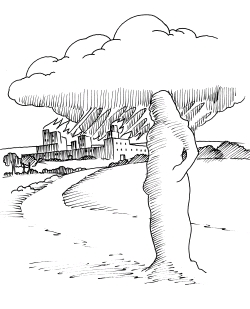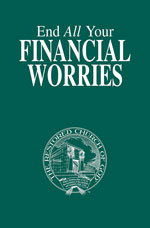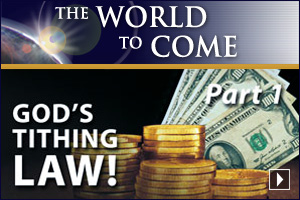Tensions increased. Men from opposing sides exchanged angry words. The scent of potential violence lingered in the air. If left unresolved, the problem could spill into bloodshed.
The patriarch Abraham (then called Abram) owned a large and growing number of oxen, goats and sheep, as did his nephew Lot. As each man’s herd increased in number, Abraham and Lot soon discovered there was not enough green pasture and fresh drinking water to supply the needs of both herds (Gen. 13:1-6). Because of this, “there was a strife between the herdsmen of Abram’s cattle and the herdsmen of Lot’s cattle” (vs. 7).
Fearing that violence would ensue, Abraham wisely offered his nephew a peaceful solution: “Is not the whole land before you? Separate yourself, I pray you, from me: if you will take the left hand, then I will go to the right; or if you depart to the right hand, then I will go to the left” (vs. 9).
Lot agreed, though probably with mixed emotion since it meant leaving Abraham, who had been a surrogate father to him for many years.
The Bible describes Lot as “just” and “righteous,” which meant he kept God’s Law. Undoubtedly he learned it growing up under the wing of his uncle and mentor, Abraham.
Lot had witnessed Abraham’s personal example of changing from a life of worshipping idols to becoming a great servant of the true God. Lot observed that when his uncle received God’s calling to leave his home, country and family to journey to a faraway foreign land, Abraham obeyed his Maker without question. Taking his wife and nephew and a caravan of servants, cattle and other possessions, Abraham departed for foreign territory, trusting in God to direct his steps. This and other tremendous instances of exercising faith must have made a profound impact on Lot’s life.
Now it was time for him to journey on his own. Lot peered into the distance, scanned the surroundings, and chose to move his herdsmen and cattle to the lush Jordan Valley, which was well watered and teeming with fertile pastures (vs. 10). This seemed like a wise choice—but Lot did not take into account the physical and spiritual dangers he would encounter there.
How Was Lot “Vexed”?
The book of Hebrews describes Abraham as a “sojourner”—a spiritual “stranger” and “pilgrim” who refused to embrace the ways of this world. He could have lived in a grand palace or some other permanent home befitting a man of his great stature and wealth. Instead, Abraham chose a nomadic life of residing in tents and moving from place to place, never settling down to establish roots in a world cut off from God. “For he looked for a city which has foundations, whose Builder and Maker is God” (Heb. 11:10).
Abraham was a type for all who “seek…first the kingdom of God, and His righteousness” (Matt. 6:33)—who “desire a better country, that is, an heavenly: wherefore God is not ashamed to be called their God: for He has prepared for them a city” (Heb. 11:16).
This was a life lesson Lot had to learn. Rather than keeping himself from becoming personally attached to society and its pagan customs and traditions, “Lot dwelled in the cities of the plain, and pitched his tent toward Sodom” (Gen. 13:12). To say that this was a HUGE mistake would be an understatement, for “the men of Sodom were wicked and sinners before the Lord exceedingly” (vs. 13).
By living among people who devoted their lives to evil, Lot was “vexed with the filthy conversation [conduct] of the wicked. (For that righteous man dwelling among them, in seeing and hearing, vexed his righteous soul from day to day with their unlawful deeds)” (II Pet. 2:7-8).
Here the word “vexed” means “to make trouble for; to treat roughly; to afflict or oppress with evils.”
Think about the wicked and corrupt behavior Lot witnessed day after day, which greatly troubled him as he strove to obey God. Imagine the worldly pulls and peer pressure he had to battle and endure as he interacted with neighbors, merchants, civic leaders and other citizens.
Ezekiel 16 states that ancient Sodom’s “iniquity” was “pride, fullness of bread, and abundance of idleness,” as well as being “haughty” and failing to care for and “strengthen the hand of the poor and needy” (vs. 49-50).
Sodom was a city of great riches, as were the other cities and towns of the plain. Its people possessed the finest foods, clothing and various other goods. With their lives surrounded by countless items of luxury, the citizens were self-satisfied and smug about their existence. They saw no need to seek after God.
Their pride led them to believe they could live any way they chose—and without consequences. When it came to matters that belonged within the holy confines of marriage, the people of Sodom and Gomorrah rebelled against God’s original intent and engaged in unspeakable practices. And they were unashamed—in fact, proud—of their “alternative lifestyles” and perverse ideas—just like the “sophisticated” and “progressive” cities of today, especially those in the modern nations of Israel (Isa. 3:9).
Sodom’s pride over its great abundance of material goods also led to government corruption and favoritism. Its people rejected God and His protection for those who obey Him, and instead trusted in a military alliance among the five cities of the plain (Gen. 14:8).
Also, residing in Sodom placed Lot in crowded living conditions. Being in daily close quarters made it easier and faster for citizens and visitors to exchange ideas, traditions, customs and practices. Lot was in the midst of this, constantly battling the temptation to mix pagan beliefs with the Way of God.

But Lot’s wife…looked back, and she became a pillar of salt.
RCG illustration/Paula Rondeau
But (you might be wondering) if living in Sodom was such a trial for Lot, why did he continue to stay there, only leaving when God sent two angels to rescue him from Sodom and Gomorrah’s impending destruction?
While the Bible does not provide an explicit answer, it does give us clues.
Why Did He Stay?
Genesis 19:1 states, “Lot sat in the gate of Sodom,” which implies he may have held some kind of government position, possibly as a magistrate or judge. Verse 9 appears to indicate this: When he confronted a raving crowd of perverse men seeking to do harm, they accused Lot of being a foreigner trying to be a judge over their conduct.
Suppose Lot had been a government official in Sodom. In a society where the wealthy and powerful did nothing to help the poor and needy, he might have convinced himself into staying, thinking he could somehow effect change by making administrative or judicial decisions based on God’s Way.
If this were the case, Sodom had already gone past the point of no return (at least in this life) in its pursuit of all things perverse. Surely, this would have vexed Lot. And his daily affliction eventually taught him what all followers of God ultimately come to understand: This world and its ways are like a condemned building, destined for destruction. It will be replaced by the kingdom of God.
There was another motive for continuing to live in Sodom: family. Lot had a wife, two unmarried daughters living at home, and at least two daughters who had married into Sodomite society (Gen. 19:14-15). Unlike Abraham, Lot had settled down and he and his family grew personally attached to the world around them. His married daughters and their husbands did not leave when told that God was about to rain fire and brimstone upon the city. Lot’s wife departed physically, but she had emotionally attached herself to Sodom—even to the point of disobeying God’s command not to look back as she fled (vs. 17).
Her mistake brought a tragic cost: “But Lot’s wife, behind him, looked back, and she became a pillar of salt” (vs. 26).
It was not until angels, disguised as men, came to warn him that Lot departed Sodom. Despite the worsening levels of wickedness that thrived in the city, which vexed him day and night, “he lingered” (vs. 16)—procrastinated. The angels literally had to take Lot by the hand to get him to leave (same verse).
They told him, “Escape for your life; look not behind you, neither stay you in all the plain; escape to the mountain, lest you be consumed” (vs. 17). But Lot was not yet ready to leave the area, so he asked permission to travel to a small nearby town (vs. 18-22). It seems he still harbored a certain attraction for the world, which he had to overcome.
Though he did keep God’s Law, Lot had to learn that “evil communications [companionship] corrupt good manners [morals, character]” (I Cor. 15:33). The Bible has much to say about this:
- “Make no friendship with an angry man; and with a furious man you shall not go: Lest you learn his ways, and get a snare to your soul” (Prov. 22:24-25).
- “Enter not into the path of the wicked, and go not in the way of evil men. Avoid it, pass not by it, turn from it, and pass away. For they sleep not, except they have done mischief; and their sleep is taken away, unless they cause some to fall. For they eat the bread of wickedness, and drink the wine of violence” (Prov. 4:14-17).
- “He that walks with wise men shall be wise: but a companion of fools shall be destroyed” (Prov. 13:20).
- “Forsake the foolish, and live; and go in the way of understanding” (Prov. 9:6).
- “Wherefore come out from among them, and be you separate, says the Lord, and touch not the unclean thing; and I will receive you” (II Cor. 6:17).
- “Blessed is the man that walks not in the counsel of the ungodly, nor stands in the way of sinners, nor sits in the seat of the scornful” (Psa. 1:1).
- “I have not sat with vain persons, neither will I go in with dissemblers. I have hated the congregation of evil doers; and will not sit with the wicked” (Psa. 26:4-5).
- “Come out of her, My people, that you be not partakers of her sins, and that you receive not of her plagues” (Rev. 18:4).
While some situations cannot be entirely avoided, intentionally allowing oneself to remain in an environment that encourages perverse thinking and lascivious lifestyles is dangerous. Doing so eventually leads to tolerating sin—clouding one’s judgment, making poor decisions and having wrong priorities. A careful read of Genesis 19 shows this is what happened to Lot.
Never allow it to happen to you.



















